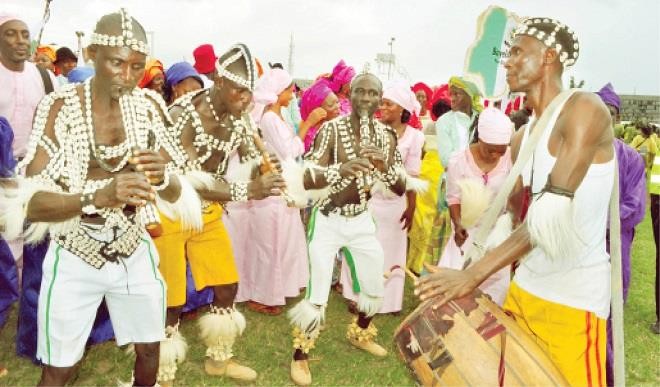NAFEST: A colourful outing in Uyo
Themed “Exploring the goldmine inherent in Nigeria’s creative industry,” this year’s edition of NAFEST was geared towards building and developing capacity of Nigerians in the creative industry, especially the youths. On the various platforms of the festival, which featured competitive and non-competitive events like dances, colloquium cultural market, visual arts, essay writing, drama, wrestling and […]


Themed “Exploring the goldmine inherent in Nigeria’s creative industry,” this year’s edition of NAFEST was geared towards building and developing capacity of Nigerians in the creative industry, especially the youths.
On the various platforms of the festival, which featured competitive and non-competitive events like dances, colloquium cultural market, visual arts, essay writing, drama, wrestling and food – guests and participants alike were also exposed to the technicalities and nitty-gritty of approaches and investments in the industry to make them self-rewarding and financially beneficial while generating employment.
The festival explored a lot of local talents with the likes of AT Bass, Twins Solototo and Sir Wilka Jackson entertaining at the opening ceremony which held at the Uyo Township Stadium.
From different events – painting, drawing, essay writing, traditional wrestling, colloquium and indigenous poetry performances, pupils and students from various academic levels, as well as youths and adults were actively involved, participating, acquiring knowledge or simply being entertained.
In spite of the economic challenges in the country, being able to hold the event this year and having the kind of output it did, is a huge success, the NCAC Executive Secretary/CEO, Mrs. Dayo Keshi, said.
Keshi who said the festival encourages healthy interactions that could lead to building bridges of understanding, harmony and peace, also said, NAFEST has over time promoted national integration, peace and unit.
These she said are evident in the participation of states, non-governmental organisations and schools as well as traders, artists, craftsmen, community-based and professional groups.
Moving away from the norm and style of carrying out the various programmes of the festival, this year it had a somewhat personal one-on-one approach and impact. This was strategic as Keshi explained that the festival’s capacity to mobilise the grassroots, the custodians of our various traditions is one of its defining characteristics.
She said: “This gives the festival the peculiar flavour of being a platform to directly engage with greater percentage of rural dwellers and producers of art, crafts and other creative products exhibited at the festival.”
The NCAC boss who said this year’s festival was designed to redirect the nation’s attention towards using the indigenous cultural products and expressions to develop the creative industry, added that NAFEST leverages on traditions, indigenous knowledge as well as the creative capital of the people.
Speaking on the cultural market which she described as “what will sustain the soul of NAFEST” Keshi said it was representational of the geo-political zones as products on display cover all aspects of Nigerian culture.
She said: “We must continue to make it a strong industry because this would reduce employment at the grassroots. I am impressed by this festival, but I am aiming that next year will be much better in terms of sales, exhibition and participation because we will start planning much earlier,” she added.
Rather than its academic-like format in previous editions, the colloquium focused on youths who listened to the lead speakers, renowned photographer, Dr. Dayo Adedayo and small-scale entrepreneur Mr. Chimezie Uwando and discussants Prof. Best Ochigbo, Prof. Femi Shaka and Ngozi John-Uyah.
It was also brisk business for food vendors, transporters, hoteliers and arts and c rafts vendors who milled around the cultural market luring prospective customers to their stalls or advertising their hand-carried wares.
Although there have been several talks of diversifying the Nigerian economy and harnessing the tourism sector to become a major income earner for the country, the sector as was evident in the non-attendance of the Minister of Information & Culture, Alhaji Lai Mohammed or any top government official asides the Permanent Secretary of the Ministry who was only there for the opening ceremony did not go unnoticed by participants and visitors to the event.
Uwem Edidiong who came to watch the traditional wrestling and also patronise the cultural market said: “I was hoping that since it is Uyo and it is peaceful, at least the minister would have come and ‘dragged’ spectators and costumers with his presence. You know Nigerians, where big man goes, they want to go.”
Another, Olanrewaju Olagunju based in Lagos, said this is his fourth time participating in NAFEST to sell his ‘adire’ and batik clothing
He said: “We are used to not seeing these people here. Every time on news, we hear them talking about growing tourism but how do they do it if they don’t come and mingle with us on occasions like this? Everything here should be about generating money whether for individual, state or nation. It is not just show and colours or exhibition. I know how much I make when I participate. So imagine if government took it seriously what they would generate from just one outing. Especially if private companies know that government is actively involved in NAFEST and with their presence or full backing which is very clear to all.
That said, maybe the NAFEST organisers also need to re-strategise to get government to be more involved,” Olagunju said.
Whereas 11 states made their presence felt from day one of the festival even though there was a significant drop in the number of contingents per states as against previous years, contingents from seven other states began trickling in at various points of the event with some like Niger State arriving just in time to witness the end of the fete – due to bad road conditions from Minna to Uyo.
Participating states included Akwa Ibom, Bauchi, Bayelsa, Benue, Delta, Kano, Katsina, Lagos, Ogun, Niger, Taraba and the FCT with Bayelsa carting away the first prize, Akwa Ibom coming second, FCT third and Lagos fourth.
